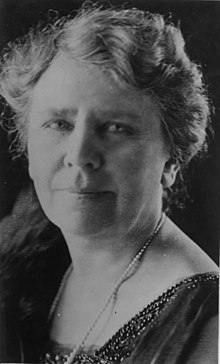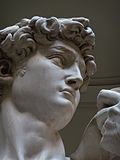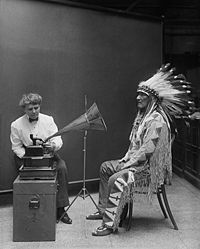Frances Densmore
Frances Densmore | |
|---|---|
 | |
| Born | May 21, 1867 Red Wing, Minnesota, U.S. |
| Died | June 5, 1957 (aged 90) United States |
| Known for | Preservation of Native American culture |
| Scientific career | |
| Fields | Anthropologist, specializing as a Comparative musicologist ethnographer and ethnomusicologist |
| Institutions | Bureau of American Ethnology |
| Part of a series on the |
| Anthropology of art, media, music, dance and film |
|---|
 |
| Social and cultural anthropology |
Frances Theresa Densmore (May 21, 1867 – June 5, 1957) was an American anthropologist and ethnographer born in Red Wing, Minnesota.[1] Densmore studied Native American music and culture, and in modern terms, she may be described as an ethnomusicologist.

Life and Works
[edit]As a child Densmore developed an appreciation of music by listening to the nearby Dakota Indians. She studied music at Oberlin College for three years.[2] During the early part of the twentieth century, she worked as a music teacher with Native Americans nationwide, while also learning, recording, and transcribing their music, and documenting its use in their culture.[1] She helped preserve their culture in a time when government policy was to encourage Native Americans to adopt Western customs.
Densmore began recording music officially for the Smithsonian Institution's Bureau of American Ethnology (BAE) in 1907. In her fifty-plus years of studying and preserving American Indian music, she collected thousands of recordings.[3] Many of the recordings she made on behalf of the BAE now are held in the Library of Congress. While her original recordings often were on wax cylinders, many of them have been reproduced using other media and are included in other archives. The recordings may be accessed by researchers as well as Tribal delegations.
Some of the Tribes she worked with include the Ojibwe, Mandan, Hidatsa, Sioux, northern Pawnee in present day Oklahoma, Tohono O'odham in present day Arizona, Indians of Washington and British Columbia, Ho-Chunk and Menominee of Wisconsin, Pueblo Indigenous peoples of the southwest, including Acoma, Isleta, Cochiti, and Zuni, Seminole in present day Florida,[4] and Kuna in Panama.[5] Densmore frequently was published in the journal American Anthropologist, contributing consistently throughout her career. Her manuscript A Study of Some Michigan Indians (1949) was the first publication in the University of Michigan Press American Anthropologist monograph series.[6][7]
She wrote The Indians and Their Music in 1926.[8] Between 1910 and 1957, she published fourteen book-length bulletins for the Smithsonian, each describing the musical practices and repertories of a different Native American group. These were reprinted as a series by DaCapo Press in 1972. Raymond DeMallie describes Densmore's Teton Sioux Music and Culture as "one of the most significant ethnographic works ever published on the Sioux."[9]
She also was a part of "A Ventriloquy of Anthros" in the American Indian Quarterly along with James Owen Dorsey and Eugene Buechel.[10]
Awards
[edit]Oberlin College awarded Densmore an honorary M.A. degree in 1924. Macalester College followed suit in 1950, awarding her an honorary Doctor of Letters degree. In 1954, the Minnesota Historical Society recognized her with its first-ever "Citation for Distinguished Service in the Field of Minnesota History."[11][12]
The National Association for American Composers and Conductors recognized Densmore in its 1940–1941 awards for her musicological work.[13]
Publications
[edit]- Chippewa Music (Washington DC, 1910–13/R)[14]
- Teton Sioux Music (Washington DC, 1918/R, 2/1992)
- Northern Ute Music (Washington DC, 1922/R)
- Mandan and Hidatsa Music (Washington DC, 1923/R)
- The American Indians and their Music (New York, 1926/R, 2/1937)
- Papago Music (Washington DC, 1929/R)
- Pawnee Music (Washington DC, 1929/R)
- Menominee Music (Washington DC, 1932/R)
- Yuman and Yaqui Music (Washington DC, 1932/R)
- Cheyenne and Arapaho Music (Los Angeles, 1936)
- Music of Santo Domingo Pueblo, New Mexico (Los Angeles, 1938)
- Nootka and Quileute Music (Washington DC, 1939/R)
- Music of the Indians of British Columbia (Washington DC, 1943/R)
- Choctaw Music (Washington DC, 1943/R)
- Seminole Music (Washington DC, 1956/R)
- Music of Acoma, Isleta, Cochiti and Zuni Pueblos (Washington DC, 1957/R)
Discography
[edit]Smithsonian-Densmore Cylinder Collection (1910–1930) [15]
Includes:
Songs of the Chippewa[16]
Songs of the Sioux [17]
Songs of the Yuma, Cocopa, and Yaqui[18]
Songs of the Pawnee and Northern Ute[19]
Songs of the Papago[20]
Songs of the Nootka and Quileute
Songs of the Menominee, Mandan and Hidatsa
See also
[edit]References
[edit]- ^ a b Gilman, Rhoda R. (1989). The Story of Minnesota's Past. Saint Paul, Minnesota: Minnesota Historical Society Press. p. 16. ISBN 0-87351-267-7.
- ^ "Frances Theresa Densmore". Oberlin College Archives. Archived from the original on May 7, 2013. Retrieved February 18, 2013.
- ^ "Frances Densmore". Smithsonian Institution Archives. Archived from the original on May 21, 2013. Retrieved September 11, 2012.
- ^ Kennedy, Stetson (1989k). Palmetto Country. Tallahassee, Florida: Florida A&M University Press. p. 354. ISBN 0-8130-0959-6.
- ^ Levine, Victoria; Lindsay, Levine; Dylan, Robinson (2019). Music and Modernity Among First Peoples of North America. Middletown, Connecticut: Wesleyan University Press. p. 21.
- ^ Griffin, James B. (October 1985). "An Individual's Participation in American Archaeology, 1928-1985". Annual Review of Anthropology. 14 (1): 1–24. doi:10.1146/annurev.an.14.100185.000245. ISSN 0084-6570. S2CID 145700192.
- ^ Densmore, Frances (1949). A Study of Some Michigan Indians. Ann Arbor, Michigan: Museum of Anthropology. ISBN 978-1-949098-42-6. Retrieved January 20, 2022.
- ^ Piehl, Cindy; Jodi Ratzlaff. "Frances Densmore". Minnesota State University, Mankato. Archived from the original on October 18, 2007. Retrieved September 3, 2007.
- ^ DeMallie, Back cover, Teton Sioux Music and Culture (Lincoln: University of Nebraska Press, 1992).
- ^ Rice, Julian (1994). "A Ventriloquy of Anthros: Densmore, Dorsey, Lame Deer, and Erdoes". American Indian Quarterly. 18 (2): 169–196. doi:10.2307/1185245. JSTOR 1185245.
- ^ "RG 30/156 - Frances Theresa Densmore (1867-1957)". Oberlin College Archives. Archived from the original on May 7, 2013. Retrieved October 19, 2020.
- ^ Johnson, Frederick. "Densmore, Frances (1867–1957)". MNopedia. Retrieved October 19, 2020.
- ^ "Frances Densmore". Encyclopedia Britannica (Public Edition). June 2023.
- ^ "Chippewa Music". 1910.
- ^ "Folk Recordings Selected from the Archive of Folk Culture (American Folklife)". www.loc.gov.
- ^ "Chippewa" (PDF). www.loc.gov. Retrieved December 22, 2019.
- ^ "Sioux" (PDF). www.loc.gov. Retrieved December 22, 2019.
- ^ "Yuma" (PDF). www.loc.gov. Retrieved December 22, 2019.
- ^ "Pawnee" (PDF). www.loc.gov. Retrieved December 22, 2019.
- ^ "papago" (PDF). www.loc.gov. Retrieved December 22, 2019.
External links
[edit]- Frances Densmore in MNopedia, the Minnesota Encyclopedia
- Bureau of American Ethnology, Bulletin 80: Mandan and Hidatsa Music, Frances Densmore
- Bureau of American Ethnology, Bulletin 161: Seminole Music, Frances Densmore
- Finding Aids to Collections in the Smithsonian Archive of Folk Culture, includes a finding aide for a Densmore collection of wax cylinders.
- Frances Densmore page from Minnesota Public Radio
- Frances Densmore Minnesota Historical Society
- "The Study of Indian Music" by Frances Densmore, in the Smithsonian Annual Report for 1941; includes good information on Densmore's equipment and methodology.
- Densmore, Frances from Grove Music Online
- Hofmann, Charles, and Densmore, Frances. Frances Densmore and American Indian music. Museum of the American Indian, Heye Foundation, 1968. doi: 10.5479/sil.451250.39088016102741
- 1867 births
- 1957 deaths
- American ethnomusicologists
- American ethnographers
- People from Red Wing, Minnesota
- Native American music
- Smithsonian Institution people
- 20th-century American anthropologists
- American women anthropologists
- American audio engineers
- Oberlin College alumni
- 20th-century American non-fiction writers
- 20th-century American women writers
- Women audio engineers
- 19th-century American anthropologists
